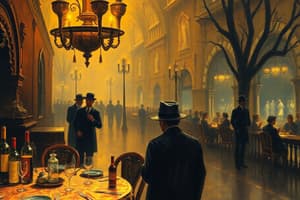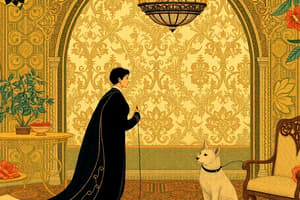Podcast
Questions and Answers
When was Mr.Blue published?
When was Mr.Blue published?
1928
What event caused the US to concentrate on domestic affairs and become preoccupied with private concerns?
What event caused the US to concentrate on domestic affairs and become preoccupied with private concerns?
The Great War (WWI)
Young people turned to new leaders and values and sought what?
Young people turned to new leaders and values and sought what?
Unorthodox dress, recreations, and morals
What was the business community praised for during the 1920s?
What was the business community praised for during the 1920s?
Which president worshipped business and what years was he in office?
Which president worshipped business and what years was he in office?
What event initiated the Great Depression?
What event initiated the Great Depression?
President Roosevelt had a strong sense of _____; he distrusted unchecked _____ and sympathized with _____.
President Roosevelt had a strong sense of _____; he distrusted unchecked _____ and sympathized with _____.
What was blamed for the collapse of the economy?
What was blamed for the collapse of the economy?
The First New Deal was successful because it focused on businesses.
The First New Deal was successful because it focused on businesses.
Briefly recount the story of how Mr.Blue became a millionaire and what he did with his money.
Briefly recount the story of how Mr.Blue became a millionaire and what he did with his money.
Describe the scene at the end of Chapter 1. What does it reveal about Mr.Blue's character?
Describe the scene at the end of Chapter 1. What does it reveal about Mr.Blue's character?
Who introduced the narrator to Mr.Blue?
Who introduced the narrator to Mr.Blue?
What word is painted on Mr.Blue's flag?
What word is painted on Mr.Blue's flag?
What kind of music does Mr.Blue like?
What kind of music does Mr.Blue like?
Who does Blue invite to his party on the roof?
Who does Blue invite to his party on the roof?
Explain the quote from Blue: 'God himself had hands like mine...'
Explain the quote from Blue: 'God himself had hands like mine...'
What did Blue think would cause a 'cult' to spring up in New York?
What did Blue think would cause a 'cult' to spring up in New York?
What kind of art does Blue dislike?
What kind of art does Blue dislike?
What promise does White make?
What promise does White make?
Briefly describe what happens after White is seen.
Briefly describe what happens after White is seen.
How many letters did Blue write?
How many letters did Blue write?
What is the one thing Blue can't stand?
What is the one thing Blue can't stand?
What does Blue compare truths to?
What does Blue compare truths to?
Blue's final letter is written to whom?
Blue's final letter is written to whom?
What is the overarching theme throughout all of Blue's letters?
What is the overarching theme throughout all of Blue's letters?
What is Blue's hometown?
What is Blue's hometown?
According to Blue, when was the earth chosen as 'home of all the universe'?
According to Blue, when was the earth chosen as 'home of all the universe'?
What is Blue's vocation?
What is Blue's vocation?
Describe Blue's 'Spies for God.'
Describe Blue's 'Spies for God.'
What is Blue's ultimate fate?
What is Blue's ultimate fate?
Define martyr. Do you think Blue was a martyr? Explain.
Define martyr. Do you think Blue was a martyr? Explain.
Flashcards are hidden until you start studying
Study Notes
Publication and Historical Context
- Mr. Blue was published in 1928.
- The Great War (WWI) shifted U.S. focus to domestic issues, preoccupying citizens with private concerns.
Social Changes and Values
- Young people embraced new leaders, unorthodox values, and lifestyles, including innovative dress and morals.
- Capitalism and materialism thrived in the 1920s, with the business community praised for its values and productivity.
Political Leadership
- President Calvin Coolidge, in office from 1923 to 1929, was known for worshipping business.
- The stock market crash of October 1929 is recognized as the trigger for the Great Depression.
President Roosevelt’s Ideals
- President Roosevelt emphasized community, distrusting unchecked individualism while sympathizing with those suffering.
The First New Deal
- The First New Deal was criticized for blaming excessive competition and production for the economic collapse.
- It was deemed unsuccessful because it primarily focused on businesses.
Mr. Blue’s Story and Character
- Mr. Blue became a millionaire after receiving two million dollars from a successful cousin; he extensively spent and gave away his wealth.
- At the end of Chapter 1, Mr. Blue is shown praying before a cross, indicating his strong religious faith.
Important Relationships
- The narrator was introduced to Mr. Blue by Stevens, the building superintendent.
- Mr. Blue asked to live on the roof of the building where Stevens worked.
Symbolism and Beliefs
- The word "Courage" is painted on Mr. Blue's flag, symbolizing his commitment to living out his destined life.
- He enjoys martial music, as it evokes feelings worth fighting for.
Community Engagement
- Mr. Blue hosted a party on the roof, inviting Stevens and Abraham Morgenthau, featuring a concert by cornetist General Grant.
Religious Philosophy
- Blue believes humanity was created in God's image, emphasizing the significance of individual existence.
- He remarked that reading the New Testament could lead to a cult for Christ's imitation.
Art and Expression
- Blue dismisses traditional art confined to galleries, admiring motion pictures for their potential to reveal God's beauty.
- He promises to bring God back to earth by creating communion wafers from harvested wheat.
Climactic Events
- After White is seen, a mob tries to attack the rooftop but fails, culminating in White's consecration representing the second coming.
- Blue's correspondence highlights humility as the recurring theme in his letters.
Personal Connections and Ideals
- Blue wrote eleven letters, expressing deep connections with derelicts as his best friends.
- He struggles against bigotry, considering it a profound evil originating from the devil.
Reflections on Truth and Home
- Blue compares truths to stars—steadfast, modest, humbling, and inspiring speculation about life.
- His hometown of Boston is cherished for its personal significance.
Voiced Beliefs and Missions
- Blue views Earth as important because Jesus Christ was born there on Christmas.
- He commits to living in poverty among the poor, sharing the story of Christ, and creates "Spies for God" to spread faith through example.
narrator’s Aspirations vs. True Vocation
- The narrator desires wealth and material comforts, contrary to Blue's divine calling which focuses on selflessness.
Mr. Blue's Hospitalization
- Blue secured a job in a lumberyard and ended up in the hospital after saving a child named Joe from an oncoming car.
Death and Legacy
- Blue does not fear death, seeing it as an opportunity for God's mercy, reinforcing his mission’s success through his visitors’ affirmations.
- Blue's death aligns with the definition of a martyr—one who suffers for their faith, indicating he willingly lived a life of poverty and purpose.
Studying That Suits You
Use AI to generate personalized quizzes and flashcards to suit your learning preferences.




